Source: ALJAZEERA
ALJAZEERA MEDIA NETWORK

Hawaiian youth achieve a monumental legal victory, compelling the state's transport department to eliminate emissions.
A landmark climate change lawsuit, initiated by 13 children and young activists in 2022, concluded with Hawaii’s department of transport committing to decarbonize its transport sector by 2045.
While Hawaii had already aimed for carbon neutrality by 2045, meaning offsetting emissions, this settlement mandates a complete cessation of emissions.
This case is revolutionary. "This is the world's first youth-led constitutional climate case targeting transportation sector emissions," Earthjustice, an environmental law organization, declared following the ruling.
Hearings for the case, initially set for next Monday, will no longer take place.
In 2022, a group of children and young individuals filed Navahine v Hawaii Department of Transportation in Hawaii’s First Circuit Court.
The plaintiffs contended that Hawaii's transportation policies and infrastructure, reliant on fossil fuels, violated their constitutional right to a clean and healthful environment.
The lawsuit invoked rights under the public trust doctrine and the Hawaii Constitution, specifically articles XI, section 1 and XI, section 9.
The public trust doctrine asserts that public natural resources are held in trust by the state for the people's benefit.
The claimants also highlighted Hawaii’s constitutional commitment to conserving natural resources, emphasizing that the transport sector might account for 60 percent of the state's emissions by 2030.
Initially scheduled for trial on Monday, Hawaii State Environmental Court Judge John Tonaki accepted the settlement before the trial's commencement.
The plaintiffs, aged nine to 18 in 2022, included 14-year-old Navahine F, a Native Hawaiian from Kaneohe, Oahu, about 32km from Honolulu.
The lawsuit argued that climate change-induced heavy rains and droughts jeopardized her family’s taro farming tradition.
"If significant emission reductions are not made, [family's wetlands] will submerge within Navahine’s lifetime," the lawsuit warned, referencing the threat of rising sea levels to Native farming practices.
Another plaintiff, 15-year-old Kaʻōnohi, expressed concerns that climate change might hinder his aspirations in marine biology or archaeology.
Hawaii Governor Josh Green stated on Thursday: "This settlement guides our state to achieve life-sustaining goals."
During a press conference, Green remarked to the plaintiffs, “It’s groundbreaking; you’re the first to succeed in a state-led case,” highlighting the significance of the achievement.
The governor's office noted this as the first youth-led constitutional climate case tackling transportation sector emissions. The statement also emphasized the state government's commitment to working with youth plaintiffs on constitutional concerns related to climate change.
Navahine expressed satisfaction with the swift outcomes, stating: “We got what we came for, and we got it faster than we expected.”
In recent years, young people worldwide have pursued legal cases for stronger climate policies, including:
Your email address will not be published. Required fields are marked *